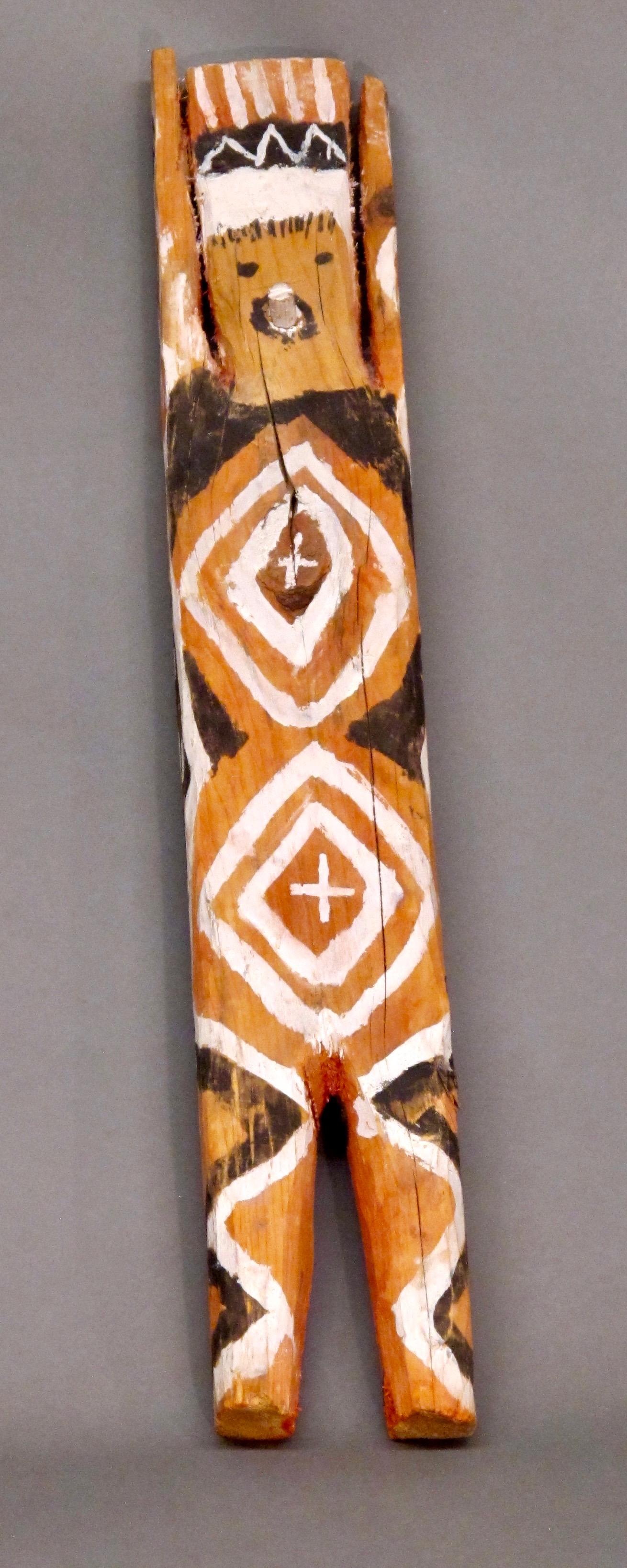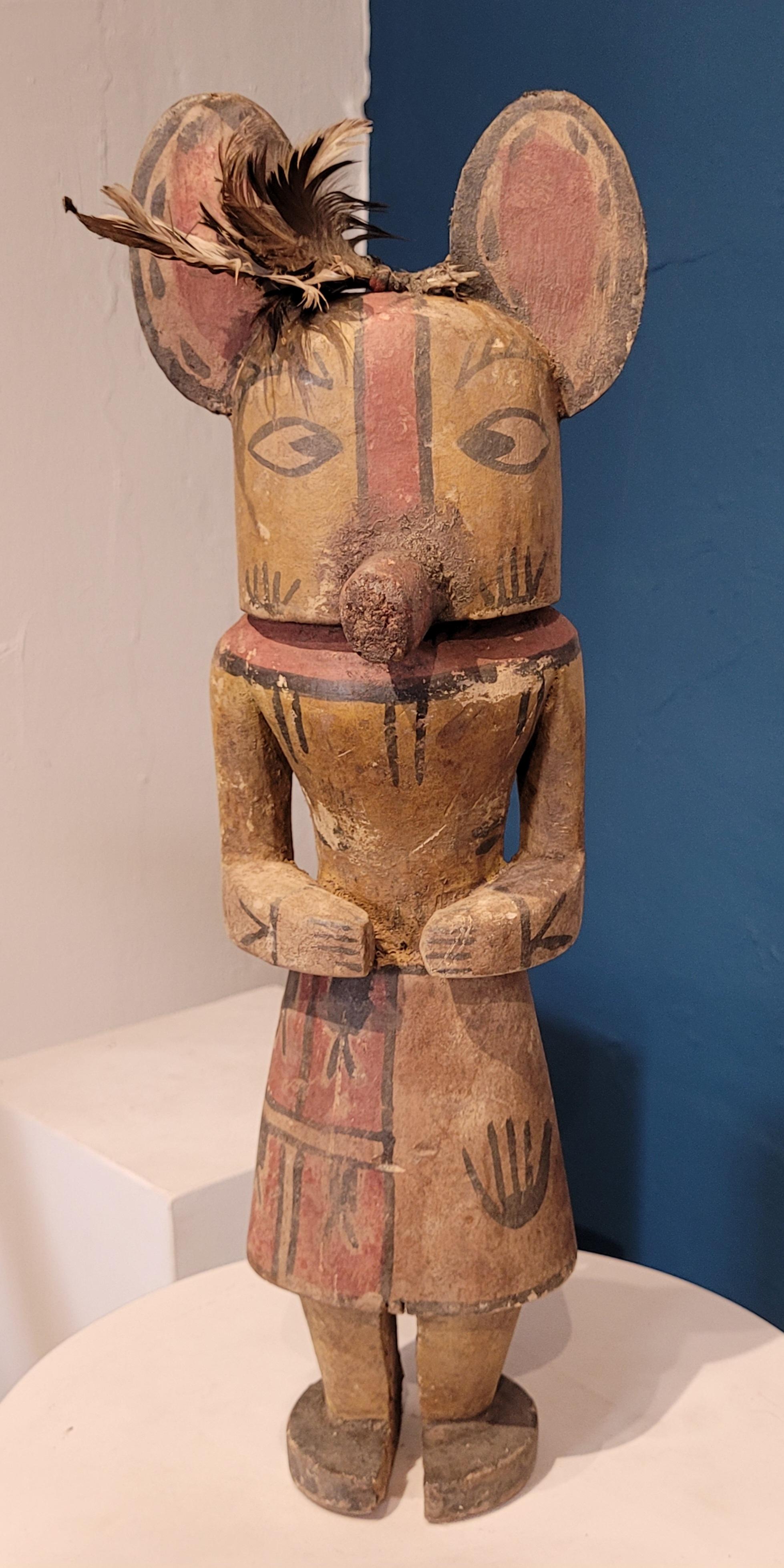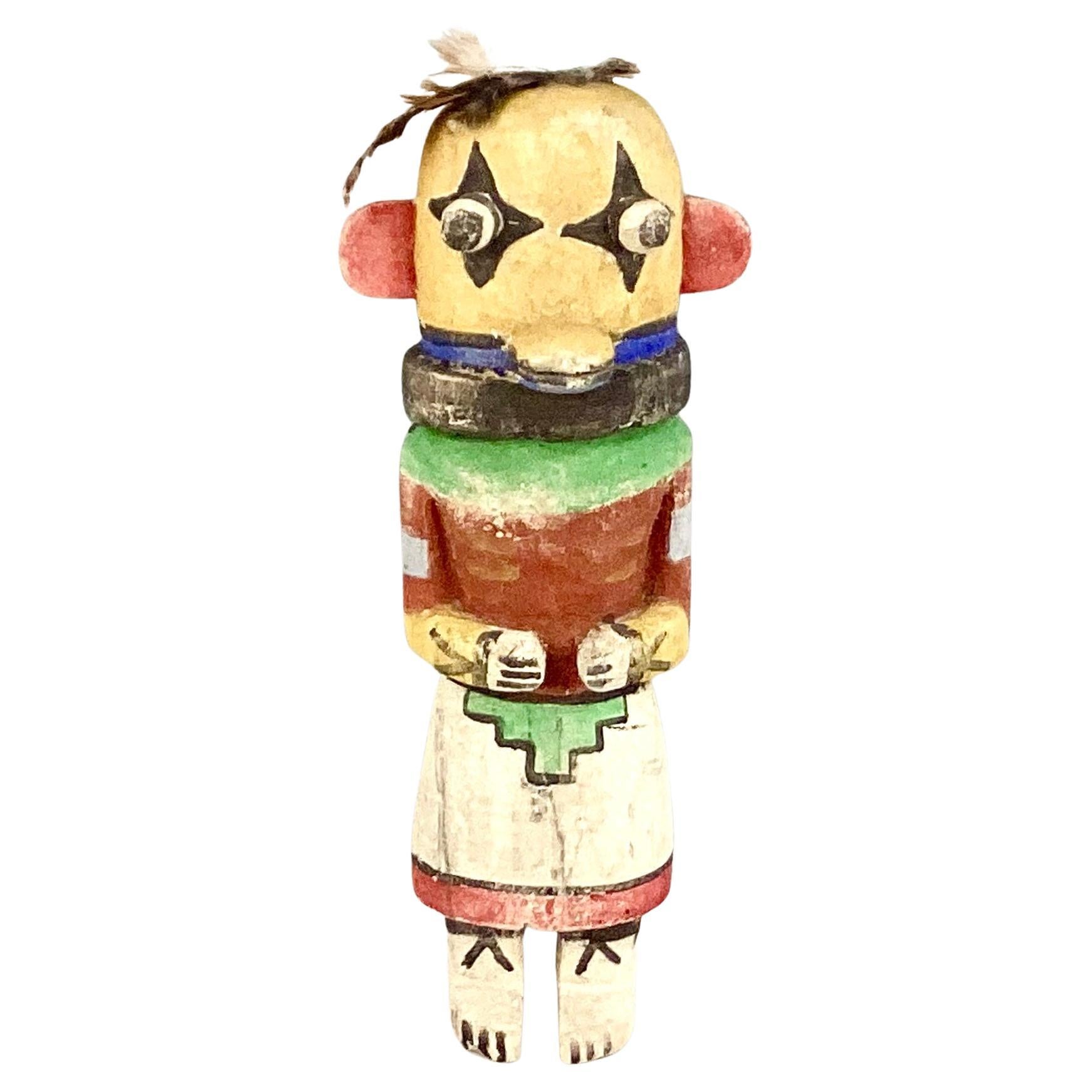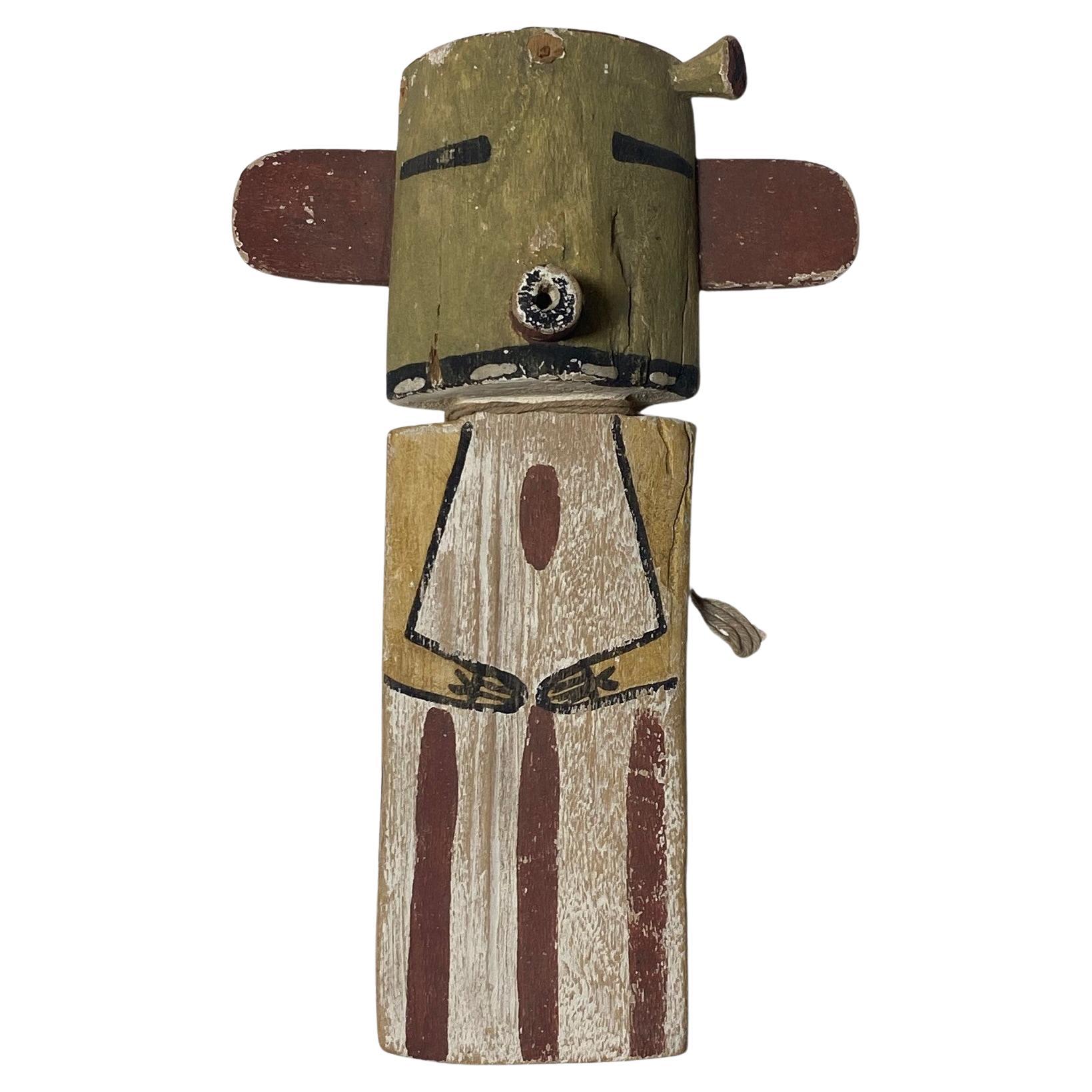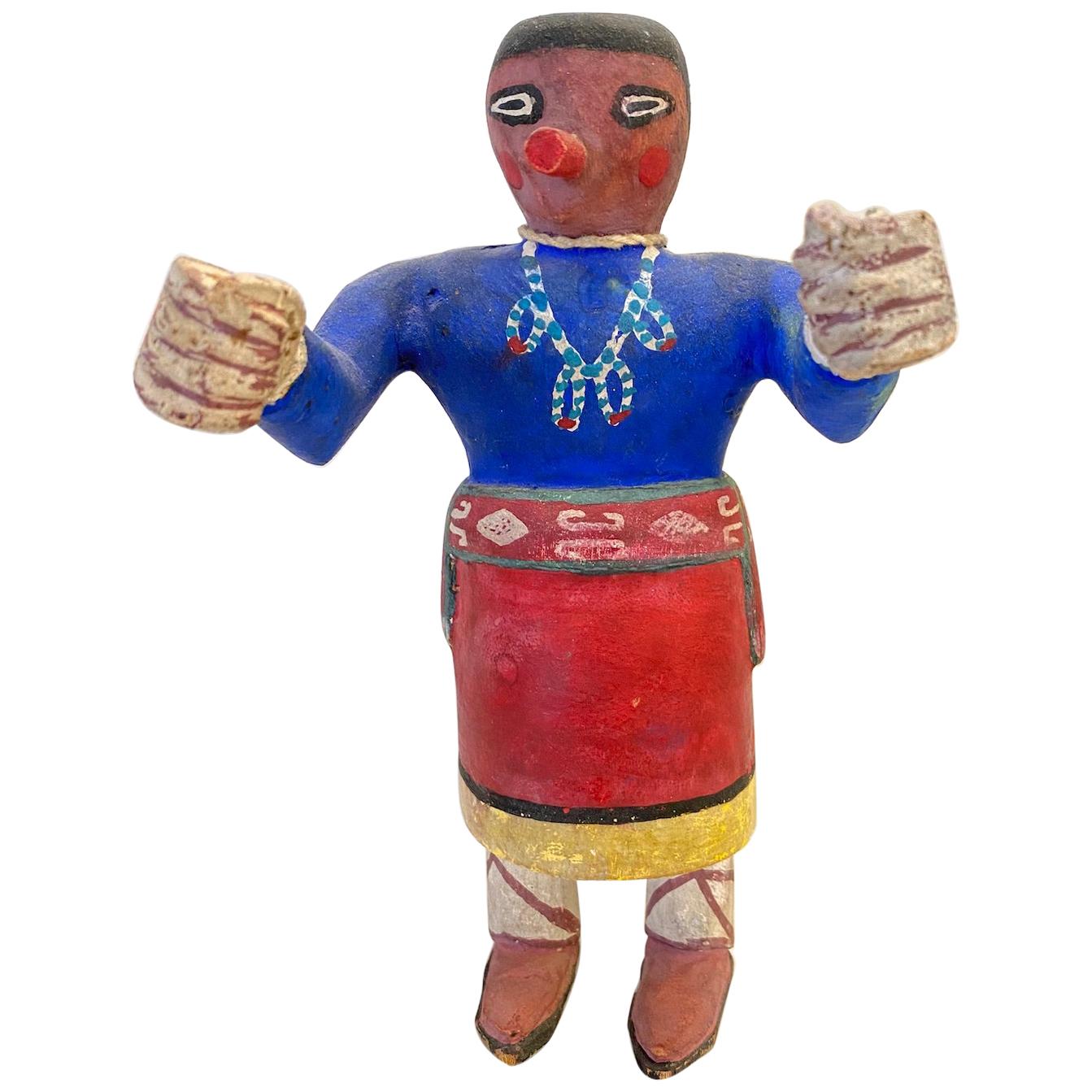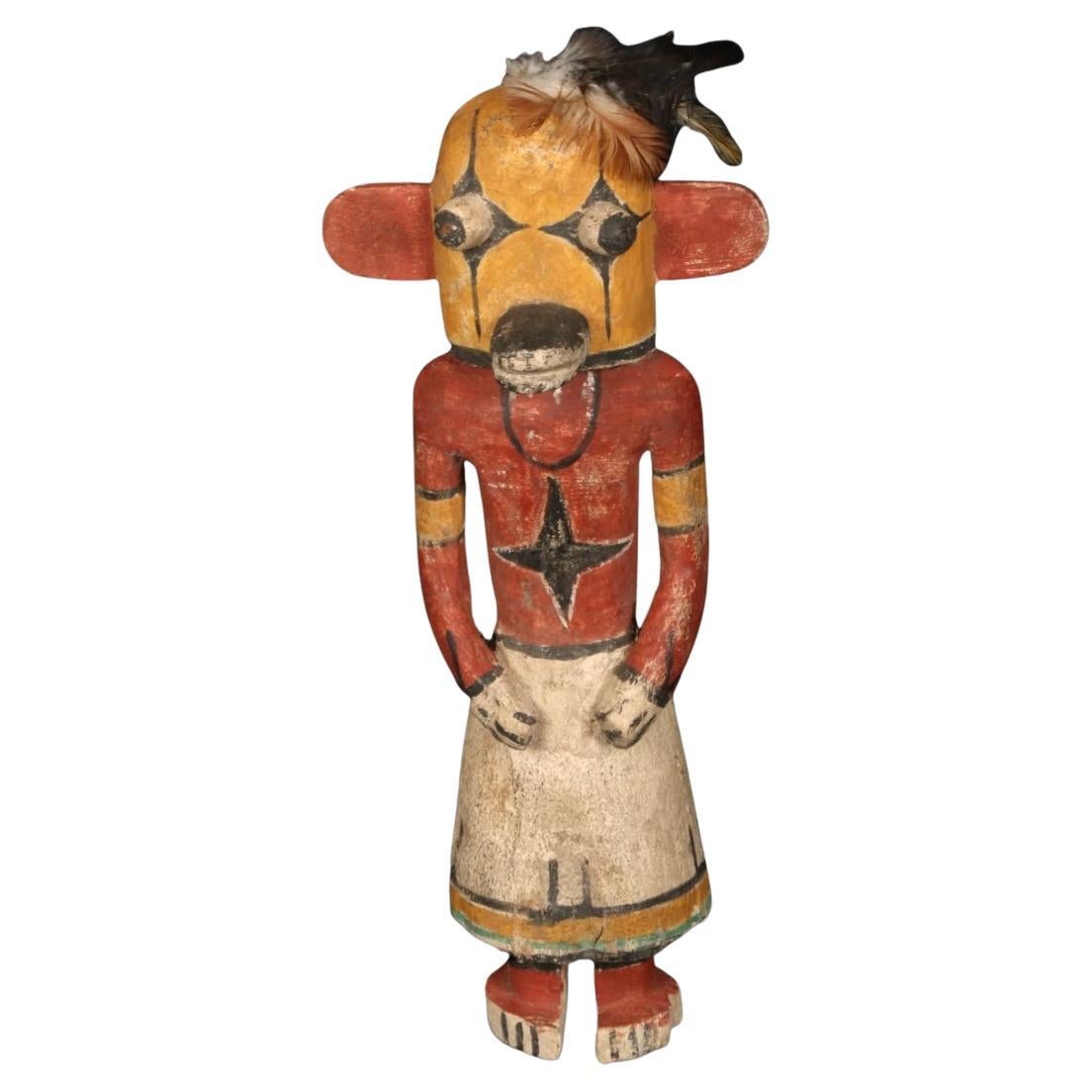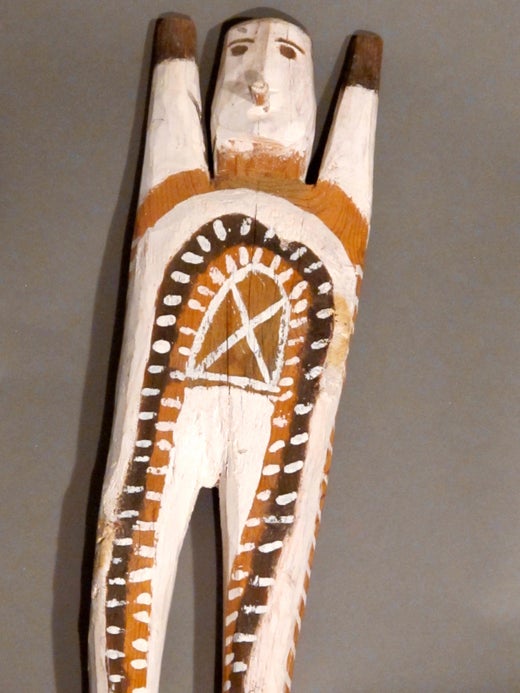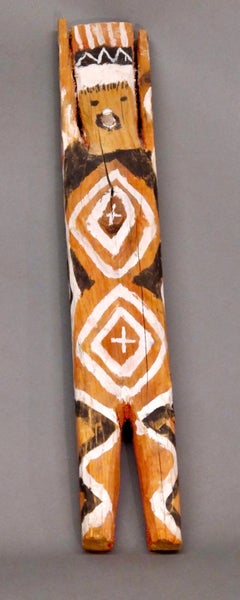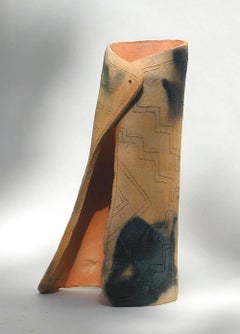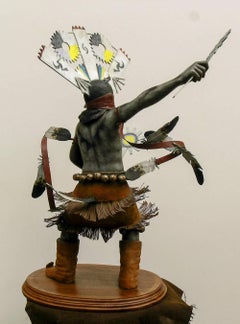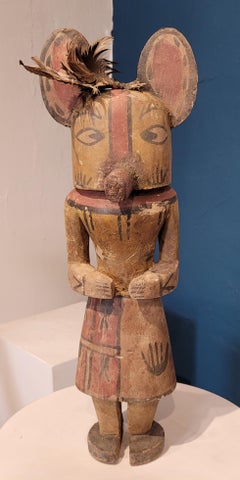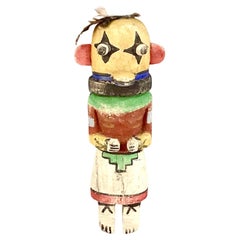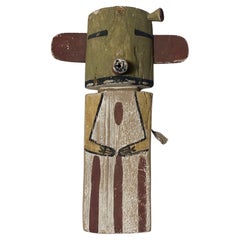Items Similar to Untitled Figure with X on Chest by Charlie Willeto, Navajo Folk Art, wood, paint
Video Loading
Want more images or videos?
Request additional images or videos from the seller
1 of 6
Charlie WilletoUntitled Figure with X on Chest by Charlie Willeto, Navajo Folk Art, wood, paint
Price Upon Request
Price Upon Request
Price Upon Request
Price Upon Request
Price Upon Request
Price Upon Request
Price Upon Request
Price Upon Request
Price Upon Request
Price Upon Request
About the Item
Untitled Figure with X on Chest by Charlie Willeto, Navajo Folk Art, wood, paint
Vintage
- Creator:Charlie Willeto (1897 - 1964, American)
- Dimensions:Height: 16 in (40.64 cm)Width: 6 in (15.24 cm)Depth: 2 in (5.08 cm)
- Medium:
- Movement & Style:
- Period:
- Condition:
- Gallery Location:Santa Fe, NM
- Reference Number:1stDibs: LU19126715412
Charlie Willeto
Charlie Willeto was an artist known for his ritualist figures of human and animal forms that carry the potency of the Navajo spirit while transcending to the realm of the mythic. He is an artist who took up carving late in his life and found himself at the forefront of Navajo folk artists.
About the Seller
4.9
Vetted Professional Seller
Every seller passes strict standards for authenticity and reliability
Established in 1966
1stDibs seller since 2015
101 sales on 1stDibs
Typical response time: 1 hour
- ShippingRetrieving quote...Shipping from: Santa Fe, NM
- Return Policy
Authenticity Guarantee
In the unlikely event there’s an issue with an item’s authenticity, contact us within 1 year for a full refund. DetailsMoney-Back Guarantee
If your item is not as described, is damaged in transit, or does not arrive, contact us within 7 days for a full refund. Details24-Hour Cancellation
You have a 24-hour grace period in which to reconsider your purchase, with no questions asked.Vetted Professional Sellers
Our world-class sellers must adhere to strict standards for service and quality, maintaining the integrity of our listings.Price-Match Guarantee
If you find that a seller listed the same item for a lower price elsewhere, we’ll match it.Trusted Global Delivery
Our best-in-class carrier network provides specialized shipping options worldwide, including custom delivery.More From This Seller
View AllNavajo Folk Art Figure, Charlie Willetto, Native American Orange White Effigy
By Charlie Willeto
Located in Santa Fe, NM
Navajo Folk Art Figure, Charlie Willetto, Native American Orange White Effigy Vintage
Navajo medicine man Charlie Willeto (1897-1964) was also an art...
Category
1960s Figurative Sculptures
Materials
Wood
Tupuna Series #2, ancestors cloak, Maori ceramic sculptor Wi Taepa, leather ties
By Wi Taepa
Located in Santa Fe, NM
Tupuna Series #2, ancestors cloak, Maori ceramic sculptor Wi Taepa, leather ties
unique ceramic sculpture depicting a cloak typically worn by Maori
Wi Te Tau Pirika Taepa (born 1946,...
Category
Early 2000s Contemporary More Art
Materials
Ceramic, Leather
Apache Mountain Spirit Dancer 1, bronze sculpture, multicolored patina Goseyun
By Craig Dan Goseyun
Located in Santa Fe, NM
Apache Mountain Spirit Dancer 1, bronze sculpture, multicolored patina Goseyun
cast and fabricated bronze sculpture depicting an Apache Mountain Spiri...
Category
1990s Contemporary Figurative Sculptures
Materials
Bronze
Gahn Dancer, Apache Mountain Spirit Dancer, bronze sculpture colored patina
By Craig Dan Goseyun
Located in Santa Fe, NM
Apache Gahn Dancer
limited bronze edtion
Category
1990s Contemporary Figurative Sculptures
Materials
Bronze
Lead Singer, bronze, sculpture, Allan Houser, Native American, Drummer, Apache
By Allan Houser
Located in Santa Fe, NM
Lead Singer, bronze, sculpture, Allan Houser, Native American, Drummer, Apache
Allan Houser Haozous Warm Springs Chiricahua Apache 1914-1994 National Medal of Arts awardee Allan Houser (Haozous), Chiricahua Apache (1914-1994) Selected Collections Centre Georges Pompidou, Paris, France * “They’re Coming”, bronze Dahlem Museum, Berlin, Germany Japanese Royal Collection, Tokyo, Japan “The Eagle”, black marble commissioned by President William J. Clinton United States Mission to the United Nations, New York City, NY *"Offering of the Sacred Pipe”, monumental bronze by Allan Houser © 1979 Presented to the United States Mission to the United Nations as a symbol of World Peace honoring the native people of all tribes in these United States of America on February 27, 1985 by the families of Allan and Anna Marie Houser, George and Thelma Green and Glenn and Sandy Green in New York City. National Portrait Gallery, Smithsonian, Washington, DC * Portrait of Geronimo, bronze National Museum of American Art, Smithsonian, Washington, D.C. * “Buffalo Dance Relief”, Indiana limestone National Museum of the American Indian, Smithsonian, Washington, D.C. *Sacred Rain Arrow, (Originally dedicated at the US Senate Committee on Indian Affairs, US Senate Building) “Goat”, “To The Great Spirit” - dedicated in 1994 at the Vice President’s Residence in Washington, D.C.. Ceremony officiated by Hillary Rodham Clinton and Tipper Gore. Oklahoma State Capitol, Oklahoma City, Ok * “As Long As the Waters Flow”, bronze Gilcrease Museum, Tulsa, OK *Sacred Rain Arrow, bronze Fort Sill, Oklahoma *”Chiricahua Apache Family”, bronze Donated and dedicated to Allan Houser’s parents Sam and Blossom Haozous by Allan Houser and Glenn and Sandy Green The Heard Museum, Phoenix, Arizona *Earth Song, marble donated by Glenn and Sandy Green The Clinton Presidential Library, Arkansas * “May We Have Peace”, bronze The George H.W. Bush Presidential Library, College Station, Texas *"Offering to the Great Spirit", bronze The British Royal Collection, London, England *Princess Anne received "Proud Mother", bronze in Santa Fe Allan Houser’s father Sam Haozous, surrendered at the age of 14 with Geronimo and his band of Warm Springs Chiricahua Apache people in 1886 in Southern Arizona. This was the last active war party in the United States. This group of Apache people was imprisoned for 27 years starting in Fort Marion, Florida and finally living in captivity in Fort Sill, Oklahoma. Allan Houser was born in 1914. His artwork is an ongoing testimony to Native life in America – its beauty, strength and poignancy. Allan Houser is from the culture and portrayed his people in an insightful and authentic way. Because of the era in which he lived, he had a rare understanding of American Indian life. Allan was the first child born after the Chiricahua Apaches were released from 27 years of captivity. Allan grew up speaking the Chiricahua dialect. Allan heard his father’s stories of being on the warpath with Geronimo and almost nightly heard his parents singing traditional Apache music. Allan’s father knew all of Geronimo’s medicine songs. Allan had an early inclination to be artistic. He was exposed to many Apache ceremonial art forms: music, musical instruments, special dress, beadwork, body painting and dynamic dance that are integral aspects of his culture. His neighbors were members of many different tribes who lived in Oklahoma. Allan eagerly gained information about them and their cultures. Allan gathered this information and mentally stored images until he brought them back to life, years later, as a mature artist. Allan Houser was represented by Glenn Green Galleries (formerly known as The Gallery Wall, Inc.) from 1973 until his death in 1994. The gallery served as agents, advocates, and investors during this time. In 1973 the Greens responded enthusiastically to the abstraction and creativity in Houser’s work. They were impressed, not only with his versatility and talent but with the number of mediums he employed. His subject matter was portrayed in styles ranging from realism, stylized form to abstraction. With encouragement from the Greens, Houser at the age of 61, retired from his post as the head of the sculpture department at the Institute of American Indian Arts in Santa Fe, New Mexico in 1975 to begin working full-time creating his art. The next 20-year period was an exciting time for Allan, the gallery, and for the Green family. He created a large body of sculpture in stone, wood and bronze. For many years Glenn Green Galleries co-sponsored many editions of his bronzes and acted as quality control for the bronze sculptures according to Houser’s wishes. As both agents and gallery representatives, the Greens promoted and sold his art in their galleries in Phoenix and Scottsdale, Arizona and in Santa Fe, New Mexico. They had bi-annual exhibits in their galleries to feature Houser’s newest work and sponsored and arranged international museum shows in America, Europe and Asia. They travelled for these events including a trip to Carrara, Italy to the famed quarries of Michelangelo and together co-financed and arranged the purchase of 20 tons of marble. A watershed event for Allan Houser’s career occurred in the early 1980’s when Glenn Green Galleries arranged with the US Information Agency a touring exhibit of his sculpture through Europe. This series of exhibits drew record attendance for these museums and exposed Houser’s work to an enthusiastic art audience. This resulted in changing the perception of contemporary Native art in the United States where Houser and Glenn Green Galleries initially faced resistance from institutions who wanted to categorize him in a regional way. The credits from the European exhibits helped open doors and minds of the mainstream art community in the United States and beyond. Senator Daniel Inouye of Hawaii was a supporter of Allan Houser’s artwork. We worked with Senator Inouye on many occasions hosting events at our gallery and in Washington D.C in support of the formation of the Smithsonian’s National Museum of the American Indian in Washington, D.C. and other causes supporting Native Americans. Allan Houser is shown below presenting his sculpture “Swift Messenger” to Senator Inouye in Washington, D.C.. This sculpture was eventually given to the National Museum of the American Indian, Smithsonian’s permanent collection. It is now currently on loan and on display in the Oval Office. President Biden’s selection of artwork continues our gallery’s and Allan’s connection to the White House from our time working with Allan Houser from 1974 until his passing in 1994. “It was important for President Biden to walk into an Oval that looked like America and started to show the landscape of who he is going to be as president,” Ashley Williams...
Category
1970s Contemporary Figurative Sculptures
Materials
Bronze
Pollen Keeper, medium, aluminum, powder coat, sculpture, Navajo, Female, red
By Melanie Yazzie
Located in Santa Fe, NM
Pollen Keeper, medium, aluminum, powder coat, sculpture, Navajo, Female, red
limited edition sculpture of 12
When the sculpture order has been placed, please allow 4 to 6 weeks for...
Category
Early 2000s Contemporary Figurative Sculptures
Materials
Metal
You May Also Like
Hopi Katsina Doll in Carved Cottonwood.
Located in Cotignac, FR
A Native North American carved wood and painted effigy figure, Hopi Katsina or Kachina doll.
A wonderfully playful, coloured and highly individual Hopi Katsina doll. Each doll repr...
Category
Mid-20th Century Figurative Sculptures
Materials
Wood
Painted Wood Hopi Katsina Kachina Figure (#2)
Located in Bradenton, FL
Hopi katsina figures (Hopi language: tithu or katsintithu), also known as kachina dolls, are figures carved, typically from cottonwood root, by Hopi people to instruct young girls an...
Category
Mid-20th Century American Native American Native American Objects
Materials
Wood
Southwestern Native American Hopi Hand Carved Child Cradle Kachina Katsina Doll
Located in Studio City, CA
A wonderfully hand-painted and decorated Native American Hopi Kachina Katsina doll. We believe this was a child's cradle first Kachina doll. It is hand carved from light wood (likel...
Category
20th Century American Native American Native American Objects
Materials
Wood, Paint
Unusual 20th Century Kachina "style" Doll of a Navajo Figure with Large Hands
Located in Van Nuys, CA
Painted cottonwood Kachina "style" doll depicting a Navajo, circa 1940s. It is in good condition, with bright color. Kachina dolls were usually created to teach Hopi children the var...
Category
Vintage 1940s American Native American Native American Objects
Materials
Wood
$360 Sale Price
20% Off
Painted Wood Hopi Kachina Figure
Located in Bradenton, FL
Hopi Katsina figures (Hopi language: tithu or katsintithu), also known as Kachina dolls, are figures carved, typically from cottonwood root, by Hopi people to instruct young girls an...
Category
Early 20th Century American Native American Native American Objects
Materials
Wood
Painted Wood Hopi Katsina Kachina Figure '#1'
Located in Bradenton, FL
Hopi katsina figures (Hopi language: tithu or katsintithu), also known as kachina dolls, are figures carved, typically from cottonwood root, by Hopi people to instruct young girls an...
Category
Mid-20th Century American Native American Native American Objects
Materials
Wood
More Ways To Browse
Charlie Brown Vintage
Vintage Block Calendar
Vintage Camping Tents
Vintage Cancan Dancer
Vintage Fishing Trawler
Vintage Hockey Skates
Vintage Pony Express
Vintage Soccer Posters
Vintage Western Movie Posters
Volkswagen Poster
Warren W Sheppard
Wild Boar Painting
William Adolphus Knell
William Chadwick
William Muller
Writers Block
Xiao Li
Yayoi Kusama Skateboard
